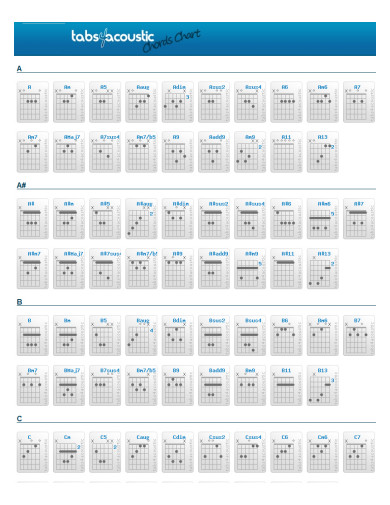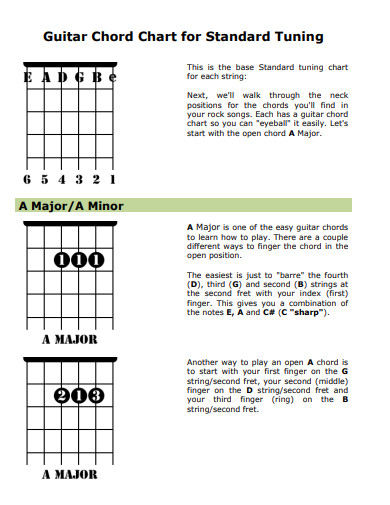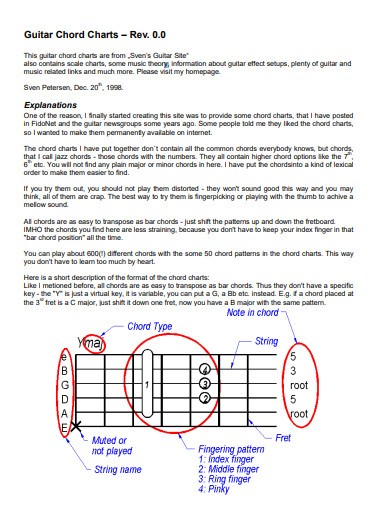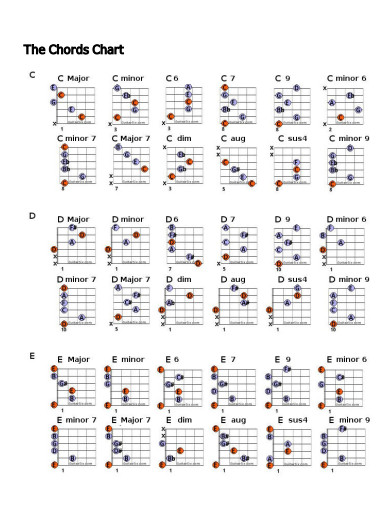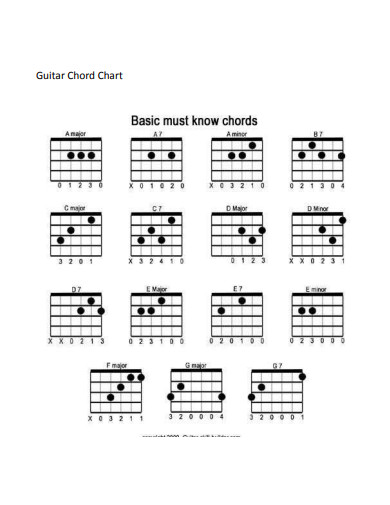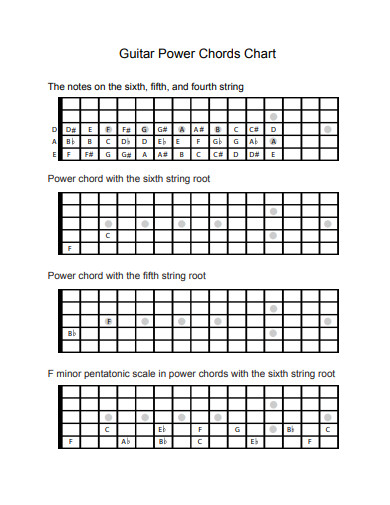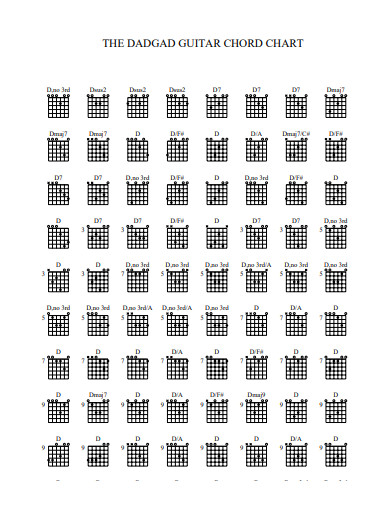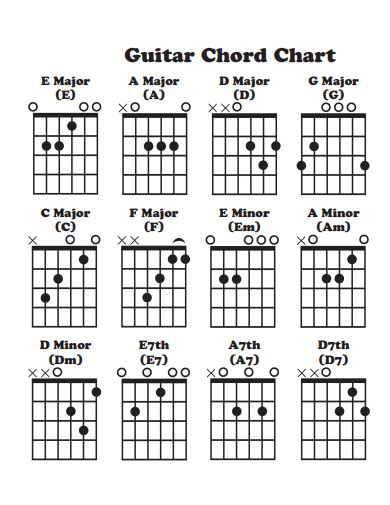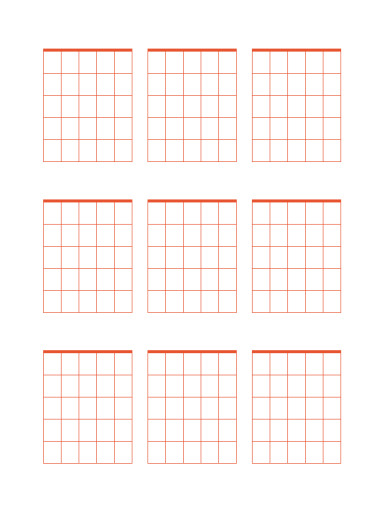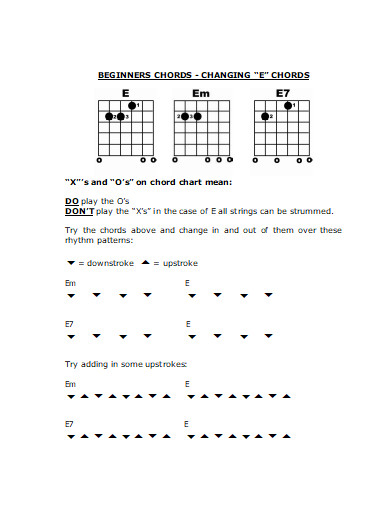One of the first skills that all guitarists learn is how to read a chord diagram. Guitar chord diagrams are the simplest and most intuitive way to illustrate where on the fingerboard you press the strings to play a chord. These diagrams are very helpful when it comes to showing chord shapes and their fingerings. Fortunately, it’s also a very easy skill to pick up and you’ll be reading chord diagrams like a pro by the end of this article.
FREE 10+ Guitar Chords Chart Samples
1. Guitar Chords Chart
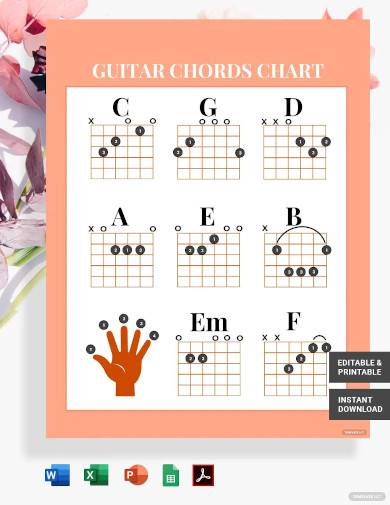
2. Sample Guitar Chords Chart
3. Guitar Chords Chart for Standard Tuning
4. Simple Guitar Chords Chart
5. Basic Guitar Chords Chart
6. Professional Guitar Chords Chart
7. Guitar Power Chords Chart
8. Beginner Guitar Chords Chart
9. Formal Guitar Chords Chart
10. Blank Guitar Chords Chart
11. Printable Guitar Chords Chart
Importance of Mastering Guitar Chords
Chords are one of the most important aspects of playing the guitar. They also help provide the rhythm of the song. Knowing how to learn chords and memorize finger placement effectively is vital for beginners. After learning where the notes lie on the fretboard you’ll begin to construct and practice chords.
How to Read Guitar Chords
Chord diagrams used in guitar chord charts as well as in many song books and on the web pages along with lyrics, to help you to focus on learning a song instead of looking up the chords elsewhere. There are a couple of types of guitar chord diagrams: Vertically Oriented and Horizontally Oriented. Vertical orientation diagram is the most used on the net. The only difference between them really is how they are positioned.
- The six vertical lines represent the strings. The low E, A, D, G, B, and the high E string are positioned from the left to the right at the chord box.
- The horizontal lines are the frets on your fingerboard. The top line of the diagram is the guitar nut, each other line towards the bottom is the 1st, 2nd, 3rd… fret accordingly.
- The horizontal and vertical lines create a simple visualization of the fingerboard. The circles in the diagram tell you where to press the strings with your fretting hand. The numbers in the circles are the recommended, comfortable fingering.
- the right vertical line represents the 1st string
- the left vertical line represents the 6th string
- the horizontal lines represent the fret bars
- the space between the horizontal lines represent the frets
- the dots tell you where to put your fingers
- the numbers underneath tell you which finger to use
- if there is a 0 then play that string open
- X means don’t play, or to mute that string
- T means to play that note with your thumb
- Different instruments use different numbering systems for your fingers. On the guitar your index finger is your 1st finger, and your pinky is your 4th. Your thumb is just indicated with a “T”.If you also play piano this may be a little confusing because your thumb is considered your 1st finger, and your pinky is considered your 5th finger.
FAQs
How long does one take to master playing the guitar?
For someone who practices around 30 minutes a day, 3-5 days a week, with medium intensity, it’ll take roughly 1-2 months to play beginner guitar songs, and approximately 3-6 months to confidently play intermediate and slightly more advanced songs with technical elements.
What chords should a beginner master?
The first 4 chords you need to learn as a beginner player are E major, E minor, A major and A minor.
How to memorize guitar chords?
- Choose four chords to memorize.
- Study the chords
- Visualize playing the chords
- Play the progression 20+ times
- Take a break
- Repeat
How many hours should you practice guitar a day?
Aim to practice guitar for at least 15 minutes per day. Try to avoid long and unbroken practice sessions of longer than one hour at a time. If you want to practice for longer than 20 minutes, set short breaks to split up your practice sessions for the best results possible.
How long does it take to learn a song on guitar?
An easy song may take a beginner anywhere from a few days to a few weeks to learn to play on the guitar. Intermediate and advanced guitarists can learn simple songs within days and complicated songs can take anywhere from weeks to months to learn.
Related Posts
FREE 10+ Seat Chart Samples in PDF
FREE 10+ Pie Chart Samples in PDF
Free 3+ Eye Color Chart Samples in PDF
FREE 10+ Family Chore Chart Samples in PDF
FREE 10+ Classroom Chart Samples in PDF
FREE 10+ Genealogy Chart Samples in PDF
FREE 10+ Shipping Chart Samples in PDF
FREE 10+ Goal Chart Samples in PDF
FREE 10+ Character Chart Samples in PDF
FREE 10+ Table Seating Chart Samples in PDF
FREE 10+ Classroom Seating Chart Samples in PDF
FREE 10+ Grade Chart Samples in PDF
FREE 10+ Workflow Chart Samples in PDF
FREE 10+ Budget Chart Samples in PDF
FREE 10+ Process Flow Chart Samples in PDF

